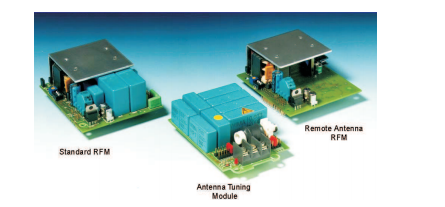Radio Frequency Module (RFM)
RFM
The Radio Frequency Module (RFM) is a device used to transmit radio frequencies between two devices. RFM’s must be paired with antennas that meet certain frequency, inductance, International Standards Organization (ISO) standards, etc. For the case of Radio Frequency Identification (RFID) tags, a frequency of 134.2 kHz, an inductance of 26 µH to 27.9 µH, ISO 11785, and require a power supply of around 10 V to 12 V. The RFM currently used in the RFID is the Texas Instruments (TI) RI-RFM-008B which initially was designed in 1998. The sponsor, Michael Lance, expressed concerns over the use of this device since the design is nearly 20 years old and could possibly be discontinued. During research for possible RFM replacements, it was quickly apparent that TI is the only company that manufactures RFM’s. Furthermore, there are only 2 RFM designs that can be successfully integrated for RFID use, the RI-RFM-008B currently used and the RI-STU-251B. The RI-STU-251B supports the antenna parameters used in RFID with the additional feature of auto tuning which could greatly simplify the reading process. However, the device costs $800 compared to the $288.24 of the current RI-RFM-008B. This price disparity is significant considering the $2500 budget for the project. Auto-tuning is likely not worth spending approximately of the budget. Considering discontinuation, 134.2 kHz RFM’s are not very common. Only 11 devices at this frequency are currently distributed by TI and only 3 can be used in the 26 µH to 27.9 µH inductance range, 1 of which is essentially a more expensive version of the RI-RFM-008B. Since the catalogue of RFM’s at these parameters is so small, it is unlikely that TI will invest in a completely new design thus any concerns about discontinuing the RI-RFM-008B are minimal and ultimately, this is the model that was selected.

